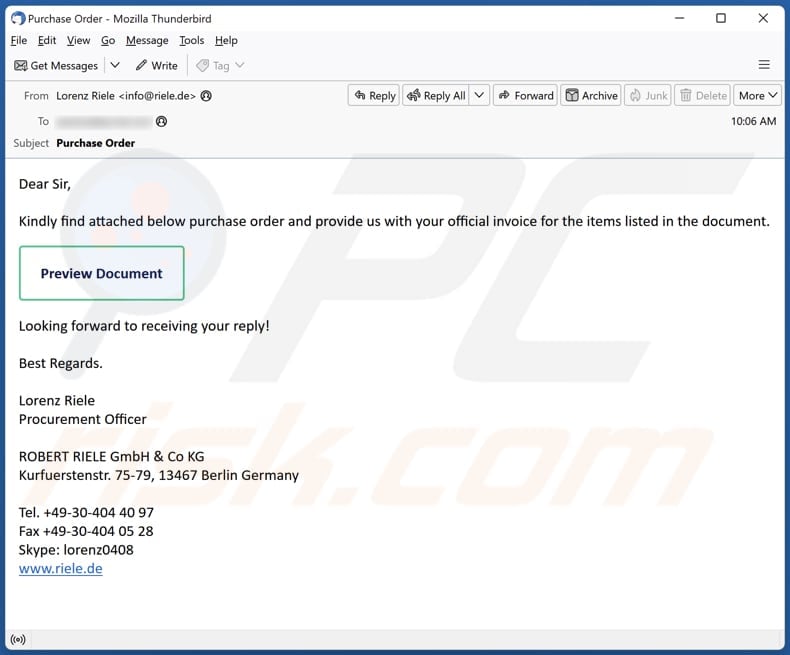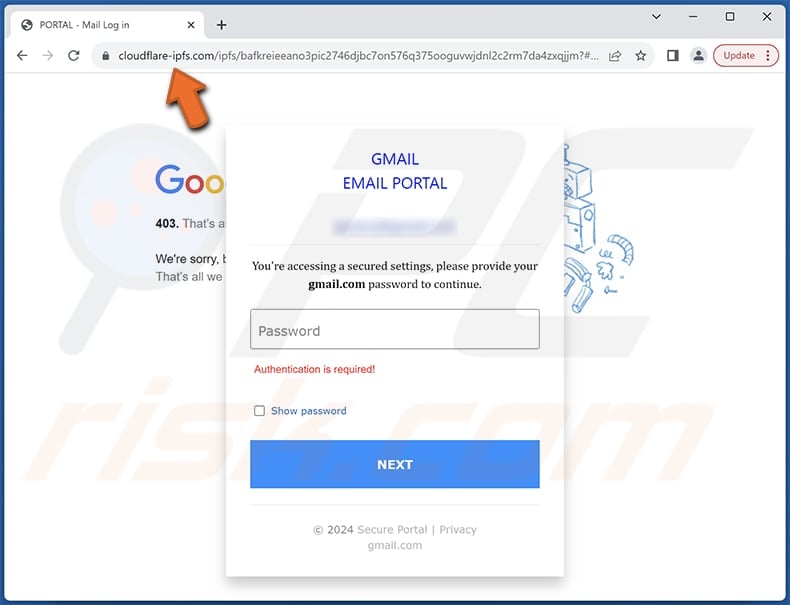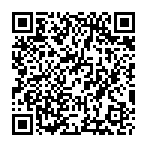How to identify scams like "Official Invoice"
![]() Written by Tomas Meskauskas on
Written by Tomas Meskauskas on
What is "Official Invoice"?
Upon scrutinizing the email, it became evident that it conforms to the characteristics of a common phishing attempt. The scammers orchestrating this scheme seek to deceive recipients by enticing them to click on the provided link, ultimately coercing them into revealing sensitive personal information. Recipients should avoid interacting with such deceptive communications.

More about the "Official Invoice" scam email
This phishing email disguises itself as a letter regarding a purchase order, claiming to be from Lorenz Riele, a supposed procurement officer at ROBERT RIELE GmbH & Co KG in Berlin, Germany. The email prompts the recipient to open an attached document for a purchase order and requests an official invoice for the listed items.
The email contains a "Preview Document" link that redirects to a fraudulent email account login page. Recipients are directed to enter their passwords, unwittingly providing scammers with access to their email account login credentials through this phishing website.
Once scammers obtain stolen email account login credentials, they exploit them for various malicious activities. Firstly, they may engage in identity theft, using the compromised email accounts to impersonate the account owners and gain unauthorized access to sensitive personal information.
Also, scammers often utilize the compromised email accounts to launch additional phishing attacks. By sending malicious emails from a trusted source, they increase the likelihood of duping the account owner's contacts into clicking on malicious links or providing sensitive information.
Furthermore, scammers may attempt to infiltrate other online accounts linked to the victim's email. Many individuals use the same passwords across multiple platforms, allowing scammers to exploit this practice and gain unauthorized access to various accounts, such as banking, social media, or e-commerce platforms.
| Name | Official Invoice Email Scam |
| Threat Type | Phishing, Scam, Social Engineering, Fraud |
| Fake Claim | Email contains a link to a purchase order |
| Disguise | Letter from procurement officer named Lorenz Riele |
| Symptoms | Unauthorized online purchases, changed online account passwords, identity theft, illegal access of the computer. |
| Distribution methods | Deceptive emails, rogue online pop-up ads, search engine poisoning techniques, misspelled domains. |
| Damage | Loss of sensitive private information, monetary loss, identity theft. |
| Malware Removal (Windows) | To eliminate possible malware infections, scan your computer with legitimate antivirus software. Our security researchers recommend using Combo Cleaner. |
Similar scam emails in general
Phishing emails typically share common elements, such as deceptive subject lines, urgent language, and a call to action that encourages recipients to click a link or open an attachment. They often impersonate legitimate entities, like businesses, using official-sounding language to create a sense of trust.
Additionally, these emails often employ social engineering tactics, preying on recipients' curiosity or concern to prompt them into divulging sensitive information or performing actions (e.g., launching malware) that compromise their security.
Examples of phishing emails are "New Purchasing Document", "Your iCloud Photos And Videos Will Be Deleted", and "Mailbox Password Security Update".
How do spam campaigns infect computers?
When threat actors use email to deliver malware, they include malicious links or attachments. Upon clicking or opening these elements, recipients unwittingly download malware onto their computers. In most cases, infections occur when users themselves activate the malware.
Various file types, including executables (.exe), PDF documents (.pdf), scripts (.js, .vbs), archives (.zip, .rar), shortcuts (.lnk), MS Office files like (.xls, .doc), installer packages (.msi, .dmg), and HTML files (.html, .htm), serve as carriers for malware delivery.
How to avoid installation of malware?
Exercise vigilance when handling emails that instruct you to open links or attachments. Refrain from accessing files or links in emails from unfamiliar addresses that appear irrelevant. Consistently apply updates to both the operating system and installed software with the latest patches.
Additionally, deploy reputable antivirus and anti-malware solutions. Abstain from interacting with dubious advertisements or downloading files from questionable sources. Always use official pages and app stores when acquiring software.
If you have already opened malicious attachments, we recommend running a scan with Combo Cleaner Antivirus for Windows to automatically eliminate infiltrated malware.
Text presented in the "Official Invoice" email letter:
Subject: Purchase Order
Dear Sir,
Kindly find attached below purchase order and provide us with your official invoice for the items listed in the document.
Preview Document
Looking forward to receiving your reply!
Best Regards.
Lorenz Riele
Procurement OfficerROBERT RIELE GmbH & Co KG
Kurfuerstenstr. 75-79, 13467 Berlin GermanyTel. +49-30-404 40 97
Fax +49-30-404 05 28
Skype: lorenz0408
www.riele[.]de
Phishing page used in this scam:

Instant automatic malware removal:
Manual threat removal might be a lengthy and complicated process that requires advanced IT skills. Combo Cleaner is a professional automatic malware removal tool that is recommended to get rid of malware. Download it by clicking the button below:
▼ DOWNLOAD Combo Cleaner
By downloading any software listed on this website you agree to our Privacy Policy and Terms of Use. To use full-featured product, you have to purchase a license for Combo Cleaner. 7 days free trial available. Combo Cleaner is owned and operated by Rcs Lt, the parent company of PCRisk.com read more.
Quick menu:
- What is Official Invoice phishing campaign?
- Types of malicious emails.
- How to spot a malicious email?
- What to do if you fell for an email scam?
Types of malicious emails:
![]() Phishing Emails
Phishing Emails
Most commonly, cybercriminals use deceptive emails to trick Internet users into giving away their sensitive private information, for example, login information for various online services, email accounts, or online banking information.
Such attacks are called phishing. In a phishing attack, cybercriminals usually send an email message with some popular service logo (for example, Microsoft, DHL, Amazon, Netflix), create urgency (wrong shipping address, expired password, etc.), and place a link which they hope their potential victims will click on.
After clicking the link presented in such email message, victims are redirected to a fake website that looks identical or extremely similar to the original one. Victims are then asked to enter their password, credit card details, or some other information that gets stolen by cybercriminals.
![]() Emails with Malicious Attachments
Emails with Malicious Attachments
Another popular attack vector is email spam with malicious attachments that infect users' computers with malware. Malicious attachments usually carry trojans that are capable of stealing passwords, banking information, and other sensitive information.
In such attacks, cybercriminals' main goal is to trick their potential victims into opening an infected email attachment. To achieve this goal, email messages usually talk about recently received invoices, faxes, or voice messages.
If a potential victim falls for the lure and opens the attachment, their computers get infected, and cybercriminals can collect a lot of sensitive information.
While it's a more complicated method to steal personal information (spam filters and antivirus programs usually detect such attempts), if successful, cybercriminals can get a much wider array of data and can collect information for a long period of time.
![]() Sextortion Emails
Sextortion Emails
This is a type of phishing. In this case, users receive an email claiming that a cybercriminal could access the webcam of the potential victim and has a video recording of one's masturbation.
To get rid of the video, victims are asked to pay a ransom (usually using Bitcoin or another cryptocurrency). Nevertheless, all of these claims are false - users who receive such emails should ignore and delete them.
How to spot a malicious email?
While cyber criminals try to make their lure emails look trustworthy, here are some things that you should look for when trying to spot a phishing email:
- Check the sender's ("from") email address: Hover your mouse over the "from" address and check if it's legitimate. For example, if you received an email from Microsoft, be sure to check if the email address is @microsoft.com and not something suspicious like @m1crosoft.com, @microsfot.com, @account-security-noreply.com, etc.
- Check for generic greetings: If the greeting in the email is "Dear user", "Dear @youremail.com", "Dear valued customer", this should raise suspiciousness. Most commonly, companies call you by your name. Lack of this information could signal a phishing attempt.
- Check the links in the email: Hover your mouse over the link presented in the email, if the link that appears seems suspicious, don't click it. For example, if you received an email from Microsoft and the link in the email shows that it will go to firebasestorage.googleapis.com/v0... you shouldn't trust it. It's best not to click any links in the emails but to visit the company website that sent you the email in the first place.
- Don't blindly trust email attachments: Most commonly, legitimate companies will ask you to log in to their website and to view any documents there; if you received an email with an attachment, it's a good idea to scan it with an antivirus application. Infected email attachments are a common attack vector used by cybercriminals.
To minimise the risk of opening phishing and malicious emails we recommend using Combo Cleaner Antivirus for Windows.
Example of a spam email:

What to do if you fell for an email scam?
- If you clicked on a link in a phishing email and entered your password - be sure to change your password as soon as possible. Usually, cybercriminals collect stolen credentials and then sell them to other groups that use them for malicious purposes. If you change your password in a timely manner, there's a chance that criminals won't have enough time to do any damage.
- If you entered your credit card information - contact your bank as soon as possible and explain the situation. There's a good chance that you will need to cancel your compromised credit card and get a new one.
- If you see any signs of identity theft - you should immediately contact the Federal Trade Commission. This institution will collect information about your situation and create a personal recovery plan.
- If you opened a malicious attachment - your computer is probably infected, you should scan it with a reputable antivirus application. For this purpose, we recommend using Combo Cleaner Antivirus for Windows.
- Help other Internet users - report phishing emails to Anti-Phishing Working Group, FBI’s Internet Crime Complaint Center, National Fraud Information Center and U.S. Department of Justice.
Frequently Asked Questions (FAQ)
Why did I receive this email?
Scammers acquire email addresses through data breaches, purchasing lists on the dark web, or generating random addresses using automated tools. Once they compile a list, they employ mass-emailing techniques, sending the exact same letter to thousands of recipients, hoping someone will fall for it.
I have provided my personal information when tricked by this email, what should I do?
If you have fallen victim to a phishing email and shared your email account login credentials, act swiftly to secure your account. Immediately change your password and enable two-factor authentication if available. Additionally, notify your email provider about the incident.
I have downloaded and opened a malicious file attached to an email, is my computer infected?
If you have opened a malicious file attached to an email, there is a risk that your computer may be infected. It depends on the file type. For instance, executable files (e.g., .exe) pose a higher risk of introducing malware to your computer. However, certain document files (e.g., MS Office documents) typically do not infect computers unless users enable macros commands.
I have read the email but didn't open the attachment, is my computer infected?
Simply accessing an email is secure. The potential risk arises when clicking links or opening attachments within the email, which can lead to system infections.
Will Combo Cleaner remove malware infections that were present in email attachment?
Combo Cleaner possesses the ability to detect and eradicate almost all known malware infections. It is crucial to recognize that sophisticated malware often hides deeply within the system, requiring a comprehensive system scan for effective detection and removal.


▼ Show Discussion